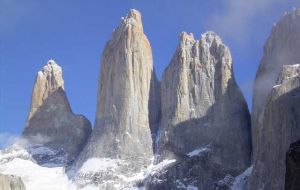MercoPress. South Atlantic News Agency
Alternative route to Torres del Paine Park cuts distance by half
 Torres del Paine National Park new route from Puerto Natales
Torres del Paine National Park new route from Puerto Natales A new alternative route linking Puerto Natales with the renowned Torres del Paine National Park, cutting in half the distance from 140 to 70 kilometres, was opened this week in Magallanes Region in the extreme south of Chile.
Puerto Natales, 250 kilometres northwest of Punta Arenas is considered the gateway to Torres del Paine and the second alternative access is described as a great leap forward for the local tourism industry and should also help promote regional residents to visit the park. The route which was designed following the Lago Porteño, Rio Serrano, Pueblo del Serrano topography demanded an investment in the range of eight million US dollars provided mostly by the national government and with logistical support from the regional government and Chilean Corps of Engineers, according to the regional representative from the Public Works ministry. Apparently the route also offers a spectacular scenery since it incorporates areas such as the Tenerife hill, the Ventisquero and Rincon rivers, the Porteño and Toro lakes, as well as the village of Pueblo del Serrano. The route is 6.6 metres wide, most of it cut out from the mountains rocky sides, and traffic must respect a maximum speed of 50 kilometres per hour and 30 kilometres in the curves and sinuous stretches. "The project is part of the national program to improve accessibility to isolated areas, helping them develop and putting in the map tourism opportunities, tourism circuits which remained virtually unknown, and will obviously benefit the region", said Magallanes Mayor Eugenia Mancilla during the inauguration ceremony. She added that several hotel projects to be developed along the alternative route, and currently under consideration, are encouraging for the tourism industry but will have to adapt to the concept of "sustainable tourism".




Top Comments
Disclaimer & comment rulesCommenting for this story is now closed.
If you have a Facebook account, become a fan and comment on our Facebook Page!